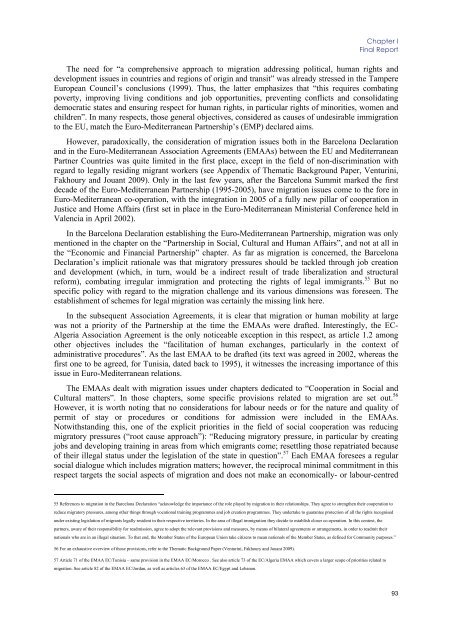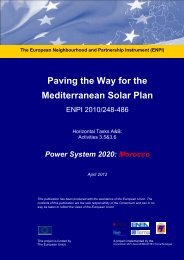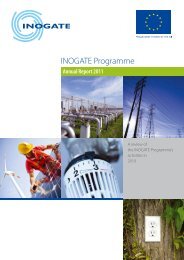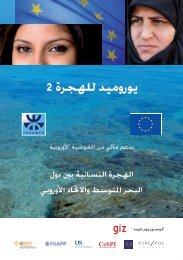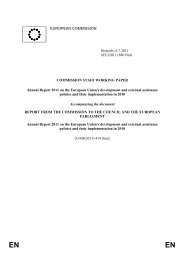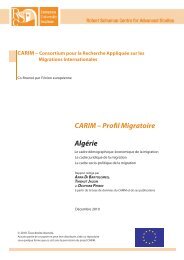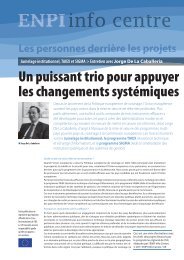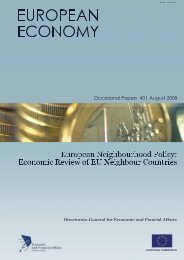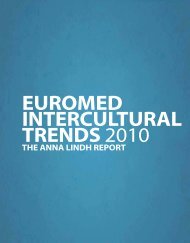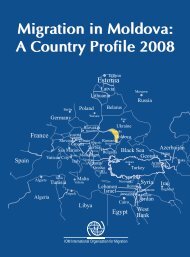Labour market performance and migration flows - European ...
Labour market performance and migration flows - European ...
Labour market performance and migration flows - European ...
Create successful ePaper yourself
Turn your PDF publications into a flip-book with our unique Google optimized e-Paper software.
Chapter IFinal ReportThe need for “a comprehensive approach to <strong>migration</strong> addressing political, human rights <strong>and</strong>development issues in countries <strong>and</strong> regions of origin <strong>and</strong> transit” was already stressed in the Tampere<strong>European</strong> Council’s conclusions (1999). Thus, the latter emphasizes that “this requires combatingpoverty, improving living conditions <strong>and</strong> job opportunities, preventing conflicts <strong>and</strong> consolidatingdemocratic states <strong>and</strong> ensuring respect for human rights, in particular rights of minorities, women <strong>and</strong>children”. In many respects, those general objectives, considered as causes of undesirable im<strong>migration</strong>to the EU, match the Euro-Mediterranean Partnership’s (EMP) declared aims.However, paradoxically, the consideration of <strong>migration</strong> issues both in the Barcelona Declaration<strong>and</strong> in the Euro-Mediterranean Association Agreements (EMAAs) between the EU <strong>and</strong> MediterraneanPartner Countries was quite limited in the first place, except in the field of non-discrimination withregard to legally residing migrant workers (see Appendix of Thematic Background Paper, Venturini,Fakhoury <strong>and</strong> Jouant 2009). Only in the last few years, after the Barcelona Summit marked the firstdecade of the Euro-Mediterranean Partnership (1995-2005), have <strong>migration</strong> issues come to the fore inEuro-Mediterranean co-operation, with the integration in 2005 of a fully new pillar of cooperation inJustice <strong>and</strong> Home Affairs (first set in place in the Euro-Mediterranean Ministerial Conference held inValencia in April 2002).In the Barcelona Declaration establishing the Euro-Mediterranean Partnership, <strong>migration</strong> was onlymentioned in the chapter on the “Partnership in Social, Cultural <strong>and</strong> Human Affairs”, <strong>and</strong> not at all inthe “Economic <strong>and</strong> Financial Partnership” chapter. As far as <strong>migration</strong> is concerned, the BarcelonaDeclaration’s implicit rationale was that migratory pressures should be tackled through job creation<strong>and</strong> development (which, in turn, would be a indirect result of trade liberalization <strong>and</strong> structuralreform), combating irregular im<strong>migration</strong> <strong>and</strong> protecting the rights of legal immigrants. 55 But nospecific policy with regard to the <strong>migration</strong> challenge <strong>and</strong> its various dimensions was foreseen. Theestablishment of schemes for legal <strong>migration</strong> was certainly the missing link here.In the subsequent Association Agreements, it is clear that <strong>migration</strong> or human mobility at largewas not a priority of the Partnership at the time the EMAAs were drafted. Interestingly, the EC-Algeria Association Agreement is the only noticeable exception in this respect, as article 1.2 amongother objectives includes the “facilitation of human exchanges, particularly in the context ofadministrative procedures”. As the last EMAA to be drafted (its text was agreed in 2002, whereas thefirst one to be agreed, for Tunisia, dated back to 1995), it witnesses the increasing importance of thisissue in Euro-Mediterranean relations.The EMAAs dealt with <strong>migration</strong> issues under chapters dedicated to “Cooperation in Social <strong>and</strong>Cultural matters”. In those chapters, some specific provisions related to <strong>migration</strong> are set out. 56However, it is worth noting that no considerations for labour needs or for the nature <strong>and</strong> quality ofpermit of stay or procedures or conditions for admission were included in the EMAAs.Notwithst<strong>and</strong>ing this, one of the explicit priorities in the field of social cooperation was reducingmigratory pressures (“root cause approach”): “Reducing migratory pressure, in particular by creatingjobs <strong>and</strong> developing training in areas from which emigrants come; resettling those repatriated becauseof their illegal status under the legislation of the state in question”. 57 Each EMAA foresees a regularsocial dialogue which includes <strong>migration</strong> matters; however, the reciprocal minimal commitment in thisrespect targets the social aspects of <strong>migration</strong> <strong>and</strong> does not make an economically- or labour-centred55 References to <strong>migration</strong> in the Barcelona Declaration “acknowledge the importance of the role played by <strong>migration</strong> in their relationships. They agree to strengthen their cooperation toreduce migratory pressures, among other things through vocational training programmes <strong>and</strong> job creation programmes. They undertake to guarantee protection of all the rights recognisedunder existing legislation of migrants legally resident in their respective territories. In the area of illegal im<strong>migration</strong> they decide to establish closer co-operation. In this context, thepartners, aware of their responsibility for readmission, agree to adopt the relevant provisions <strong>and</strong> measures, by means of bilateral agreements or arrangements, in order to readmit theirnationals who are in an illegal situation. To that end, the Member States of the <strong>European</strong> Union take citizens to mean nationals of the Member States, as defined for Community purposes.”56 For an exhaustive overview of those provisions, refer to the Thematic Background Paper (Venturini, Fakhoury <strong>and</strong> Jouant 2009).57 Article 71 of the EMAA EC/Tunisia – same provision in the EMAA EC/Morocco . See also article 73 of the EC/Algeria EMAA which covers a larger scope of priorities related to<strong>migration</strong>. See article 82 of the EMAA EC/Jordan, as well as articles 63 of the EMAA EC/Egypt <strong>and</strong> Lebanon.93


